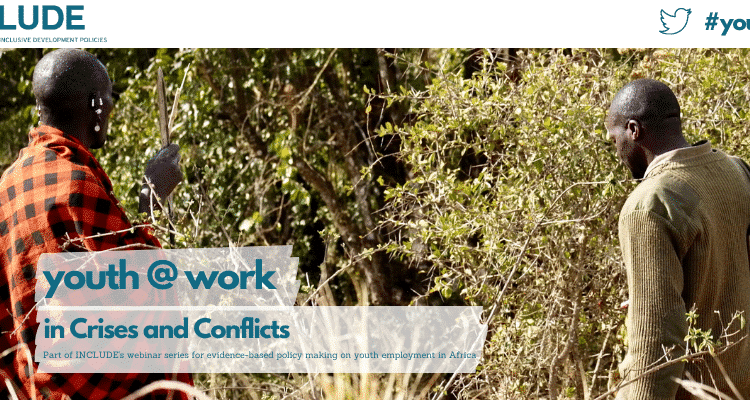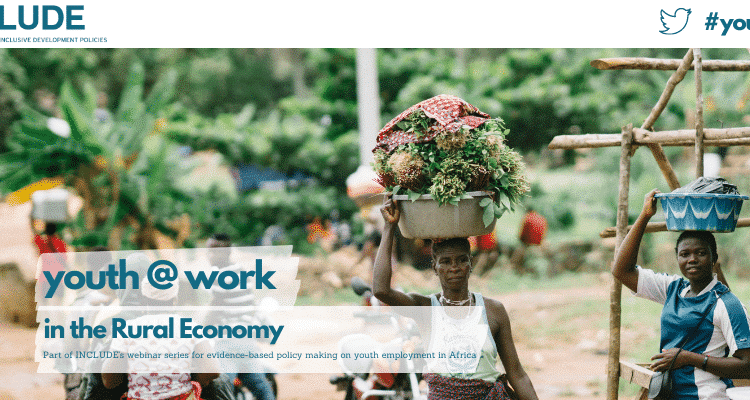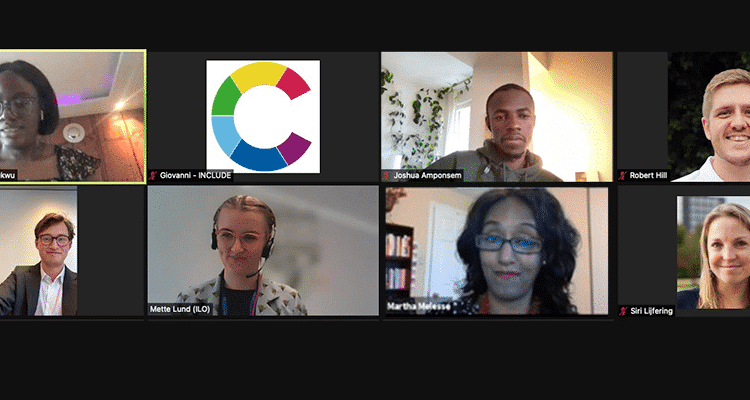
What are the policies and programs elaborated and implemented by African governments to stimulate the creation of youth employment opportunities? These were the main questions of this week’s Youth@Work webinar, hosted by INCLUDE, with the support of Canada’s International Development Research Centre (IDRC) and the International Labour Organization (ILO). During the Youth@Work webinar series, researchers, practitioners, policymakers and youth come together to share knowledge and good practices on youth employment in Africa. This article presents the key insights emerging from the online event.
Despite remarkable GDP growth levels in Africa in recent decades, this growth has not been accompanied by increased employment and more decent work. Rather, it has resulted in rising inequalities and ‘jobless growth’, which does not reap benefits equally across society. The call for inclusive growth; growth that emphasizes equity and equality of opportunities and distributes the benefits of economic progress more equitably across societies, is increasingly growing louder. Stimulating employment through national youth policies, value chain and market system development, active labour market policies, and directly employing youth in the public sector are some of the approaches African governments employ to stimulate inclusive growth in their countries.
Implementation
In the past decades, youth employment has gained increased attention in policy agendas at various levels in the African context. However, as Marieke Meeske, Impact Measurement and Knowledge specialist at Oxfam Novib and author of the evidence synthesis paper (ESP) on the role of governments and policies in youth employment, shared, despite the concrete ambitions stated in policies and action plans, there is often a lack of implementation of these policies in practice. Particularly, when it comes to youth diversity, policies are often formulated with different target groups in mind, but in the implementation, the heterogeneity of youth and their diverse needs and ambitions are hardly taken into account. According to Meeske, African governments need to focus on meaningful youth participation, not just in the formulation, but also in the decision-making stage of policy-making.
An interesting example in this respect was presented by Ahmed Ali, the Just Economy and Economic Development Coordinator at Oxfam Novib in Somalia, who shared how the government in Somaliland invited youth to co-create policies related to youth employment. Youth here were involved in every phase of the policymaking from the design to the implementation stage. As a result of this co-creation process, a national internship programme was launched to stimulate youth in their entry into the job market.
Unemployment, underemployment and working poverty
Although a youth-lens is indeed important when it comes to designing effective employment policies, there is a need to take a broader economic perspective on labour in Africa according to Bernd Mueller, Employment Specialist in ILO’s Decent Work Team for Eastern & Southern Africa. ‘The main issue is that there is simply not enough labour demand compared to labour supply. Simply speaking; there are not enough economic opportunities to participate in the labour market across the board. Addressing this deficit requires a structural economic transformation and that’s where our focus needs to be’, stated Bernd.
Especially in Africa, it is in many countries more a case of underemployment than unemployment. “Most people are too poor to be unemployed”, explains Bernd. “They don’t have the luxury to be unemployed, they need to work in order to get by’. The main problem, in this case, is the quality of the work that is lacking, long working hours, no social protection and uncertainty. As a result of the COVID pandemic, this has become even more apparent as for the first time in 20 years the rate of working poverty on the continent has increased. According to Bernd, the structural economic transformation needs to be guided by three main principles: quantity, quality and non-discrimination in national employment policies.
Changing the queue
When designing solutions to address youth unemployment it is, according to Bernd, also crucial to come up with comprehensive policies that address both the supply and the demand side of labour. ‘Looking at the current policies and programmes, these are mostly supply-side interventions, focusing on access to finance, skills development and entrepreneurship. However, without creating new jobs, this just leads to ‘changing the queue’, warns Bernd. ‘Skills development might give recipients of the training a head-start in finding a job, but fundamentally it doesn’t change anything as it does not address the core issue of a lack of jobs.’
When it comes to youth employment programmes there is often a focus on creating ‘sexy jobs’ that youth would find attractive to work in, states Bernd. However, in order to create the massive job growth that will be required in the coming decades, we also need to look at the sectors that can absorb youth across the spectrum, such as the manufacturing industry or agriculture. “We need to create the jobs for the labour force we have, not the labour force we want”, states Bernd.
Entrepreneurship as a religion
Theodore Klouvas, Senior Policy Officer Youth Employment at the Dutch Ministry of Foreign Affairs and Program Manager of Orange Corners, agrees with Bernd that entrepreneurship is not a silver bullet when it comes to creating employment for youth on the continent. According to Klouvas: ‘Entrepreneurship has become a new religion in youth employment strategies, with business hubs mushrooming all over the continent, but entrepreneurship development might not necessarily be the most efficient or effective way to stimulate the job market in the long run. ‘What we see’, Klouvas explains, ‘is that a lot of youth employment programmes focus on skills development through training, but often the trainings that are offered do not equip students with the necessary skills for the current job market nor for the future of work.’
Tatenda Dumba, who works for the Dutch Ministry of Foreign Affairs as a regional financial advisor for development budgets for the Dutch embassies in Tunisia, Libya, Morocco and Algeria, agrees with Klouvas and Bernd that the effects of entrepreneurship on youth employment creation should not be overstated. ‘In most cases entrepreneurship takes place in micro, small and medium entrepreneurs (MSMEs) with no real perspective to grow, because they are crowded out or suffer from stifling taxation policies. Therefore, if we want to tap the potential of entrepreneurship for youth employment we have to work on creating an enabling environment that is supported by a coherent and comprehensive policy strategy.’
In this respect, both Dumba and Klouvas also plead for a contextualised approach whereby an ecosystem approach and meaningful youth participation are key to ensure that youth employment policies and programmes are not set up as single projects, detached from society, but are part of an ecosystem approach to create a structural transformation. According to Klouvas: ‘Youth have to be invited to sit around the table and be part of the design, implementation and evaluation of youth employment policies. Never again should we design anything without meaningful participation: nothing about them, without them.’


